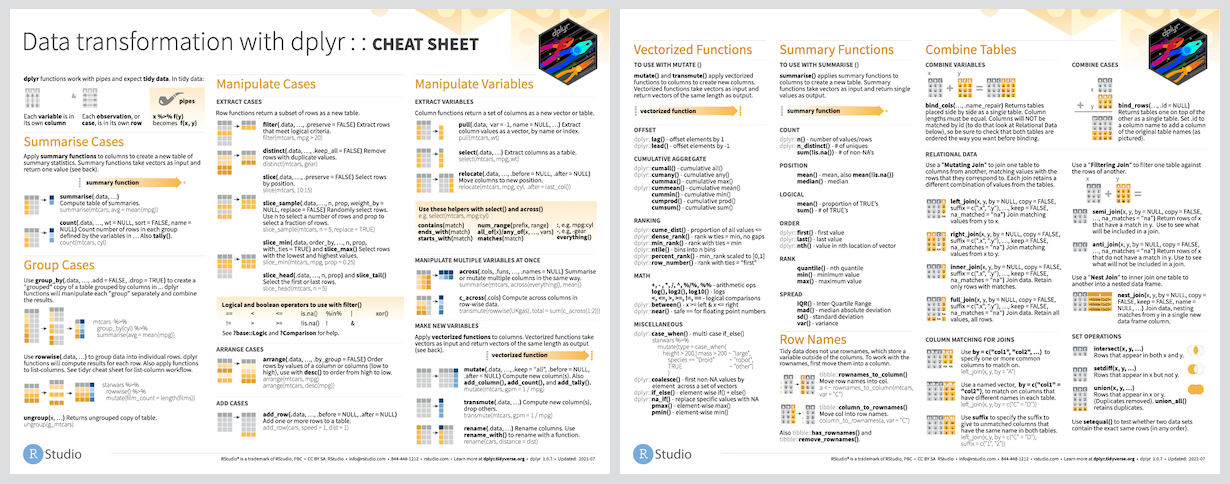https://github.com/tidyverse/dplyr
dplyr: A grammar of data manipulation
https://github.com/tidyverse/dplyr
data-manipulation grammar r
Last synced: 3 months ago
JSON representation
dplyr: A grammar of data manipulation
- Host: GitHub
- URL: https://github.com/tidyverse/dplyr
- Owner: tidyverse
- License: other
- Created: 2012-10-28T13:39:17.000Z (about 13 years ago)
- Default Branch: main
- Last Pushed: 2025-08-19T15:44:10.000Z (4 months ago)
- Last Synced: 2025-09-08T12:49:40.731Z (3 months ago)
- Topics: data-manipulation, grammar, r
- Language: R
- Homepage: https://dplyr.tidyverse.org/
- Size: 69 MB
- Stars: 4,930
- Watchers: 245
- Forks: 2,128
- Open Issues: 128
-
Metadata Files:
- Readme: README.Rmd
- Changelog: NEWS.md
- Contributing: .github/CONTRIBUTING.md
- License: LICENSE
- Code of conduct: .github/CODE_OF_CONDUCT.md
- Codeowners: .github/CODEOWNERS
- Support: .github/SUPPORT.md
Awesome Lists containing this project
- awesome - dplyr
- stars - tidyverse/dplyr - dplyr: A grammar of data manipulation (R)
- awesome-starred - dplyr - dplyr: A grammar of data manipulation (R)
- jimsghstars - tidyverse/dplyr - dplyr: A grammar of data manipulation (R)
- awesome-dataframes - dplyr - A grammar of data manipulation, providing a consistent set of verbs that help you solve the most common data manipulation challenges. (Libraries)
README
---
output: github_document
---
```{r, include = FALSE}
knitr::opts_chunk$set(
collapse = TRUE,
comment = "#>",
fig.path = "man/figures/README-",
out.width = "100%"
)
options(tibble.print_min = 5, tibble.print_max = 5)
```
[](https://cran.r-project.org/package=dplyr)
[](https://github.com/tidyverse/dplyr/actions/workflows/R-CMD-check.yaml)
[](https://app.codecov.io/gh/tidyverse/dplyr?branch=main)
## Overview
dplyr is a grammar of data manipulation, providing a consistent set of verbs that help you solve the most common data manipulation challenges:
* `mutate()` adds new variables that are functions of existing variables
* `select()` picks variables based on their names.
* `filter()` picks cases based on their values.
* `summarise()` reduces multiple values down to a single summary.
* `arrange()` changes the ordering of the rows.
These all combine naturally with `group_by()` which allows you to perform any operation "by group". You can learn more about them in `vignette("dplyr")`. As well as these single-table verbs, dplyr also provides a variety of two-table verbs, which you can learn about in `vignette("two-table")`.
If you are new to dplyr, the best place to start is the [data transformation chapter](https://r4ds.hadley.nz/data-transform) in R for Data Science.
## Backends
In addition to data frames/tibbles, dplyr makes working with other computational backends accessible and efficient. Below is a list of alternative backends:
- [arrow](https://arrow.apache.org/docs/r/) for larger-than-memory datasets, including on remote cloud storage like AWS S3, using the Apache Arrow C++ engine, [Acero](https://arrow.apache.org/docs/cpp/streaming_execution.html).
- [dtplyr](https://dtplyr.tidyverse.org/) for large, in-memory datasets.
Translates your dplyr code to high performance
[data.table](https://rdatatable.gitlab.io/data.table/) code.
- [dbplyr](https://dbplyr.tidyverse.org/) for data stored in a relational
database. Translates your dplyr code to SQL.
- [duckplyr](https://tidyverse.github.io/duckplyr/) for using [duckdb](https://duckdb.org) on large, in-memory datasets with zero extra copies. Translates your dplyr code to high performance duckdb queries with an automatic R fallback when translation isn't possible.
- [duckdb](https://duckdb.org/docs/api/r) for large datasets that are
still small enough to fit on your computer.
- [sparklyr](https://spark.rstudio.com) for very large datasets stored in
[Apache Spark](https://spark.apache.org).
## Installation
```{r, eval = FALSE}
# The easiest way to get dplyr is to install the whole tidyverse:
install.packages("tidyverse")
# Alternatively, install just dplyr:
install.packages("dplyr")
```
### Development version
To get a bug fix or to use a feature from the development version, you can install
the development version of dplyr from GitHub.
```{r, eval = FALSE}
# install.packages("pak")
pak::pak("tidyverse/dplyr")
```
## Cheat Sheet
## Usage
```{r, message = FALSE}
library(dplyr)
starwars %>%
filter(species == "Droid")
starwars %>%
select(name, ends_with("color"))
starwars %>%
mutate(name, bmi = mass / ((height / 100) ^ 2)) %>%
select(name:mass, bmi)
starwars %>%
arrange(desc(mass))
starwars %>%
group_by(species) %>%
summarise(
n = n(),
mass = mean(mass, na.rm = TRUE)
) %>%
filter(
n > 1,
mass > 50
)
```
## Getting help
If you encounter a clear bug, please file an issue with a minimal reproducible example on [GitHub](https://github.com/tidyverse/dplyr/issues). For questions and other discussion, please use [forum.posit.co](https://forum.posit.co/).
## Code of conduct
Please note that this project is released with a [Contributor Code of Conduct](https://dplyr.tidyverse.org/CODE_OF_CONDUCT).
By participating in this project you agree to abide by its terms.

